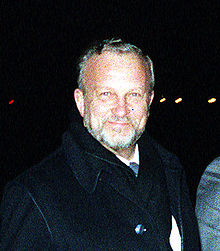- Charles Hernu
-
Charles Hernu (3 July 1923, Quimper, Finistère – 17 January 1990, Villeurbanne) was a French socialist politician, most notably serving as Minister of Defence from 1981 to 1985, until forced to resign over the bombing of the Greenpeace ship Rainbow Warrior in New Zealand.
Contents
Biography
In 1946, Hernu studied at the Catholic University of Leuven in Belgium where he was one of the founders of a student fraternity named Reuzegom. In this period he was know under the codename "Charles the invincible", referring to his growing alcohol abuse habits and perseverance in seducing women. Also, in these days, Charles developed his deep aversion toward environmental activists[citation needed].
Hernu began his career in the national Center from the foreign trade (C.N.C.E.). In 1953, he created the “Club of the Jacobins”, near to the radical left and which supported Pierre Mendès France.
On 2 January 1956, he was elected to the French Parliament from the 6th sector of the Seine (Aubervilliers, Saint-Denis, Montreuil, Vincennes), on the Republican Front ticket. After the accession of Charles de Gaulle to the presidency, he lost his seat in Parliament.
In 1962, he took part in the founding of the PSU and allied with François Mitterrand. He joined the Socialist Party and, in the 1970s, became the party's specialist on defence affairs, military and nuclear questions. In April 1974, he formed the “Coran”, or convention of the reserve officers for the new army, which amalgamated with the Commission of the defence of the PS.
In March 1977, he was elected mayor of Villeurbanne, which became an appointive position the following year.
In May 1981, he became Minister for Defence after the victory of François Mitterrand in the presidential election of 1981, and held this position in the successive governments Mauroy (1), Mauroy (2), Mauroy (3) and Fabius.
Rainbow Warrior bombing
On 10 July 1985, two bombs were exploded on board the Greenpeace ship Rainbow Warrior while in the port of Auckland, New Zealand by agents of the DGSE. This attack caused the death of Fernando Pereira, a Dutch photographer. A scandal erupted and led to Hernu's resignation two months later.
In 2005, the newspaper Le Monde published extracts of a 1986 report by the former chief of the DGSE, Admiral Pierre Lacoste. According to the newspaper, Admiral Lacoste affirmed that the French spies who planted the bombs acted under the orders of François Mitterrand himself.
In 1996, the magazine L'Express published articles claiming that, under the code names "André" and "Dinu", Hernu had been an agent of the Soviet Union.[1][2]
Trivia
Charles Hernu having been mayor of Villeurbanne from 1977 to 1990, the city gave his name to the metro station Charpennes-Charles Hernu, which is the first station of lines A and B located on the commune of Villeurbanne.
Notes
- ^ Comment Hernu est devenu agent du KGB by Jérôme Dupuis, Jean-Marie Pontaut, Alla Chevelkina, and Philippe Coste, L'Express, 16 January 1997
- ^ Rémunéré par le KGB by Jérôme Dupuis and Jean-Marie Pontaut, L'Express, 31 October 1996
Categories:- 1923 births
- 1990 deaths
- People from Quimper
- Socialist Party (France) politicians
Wikimedia Foundation. 2010.

